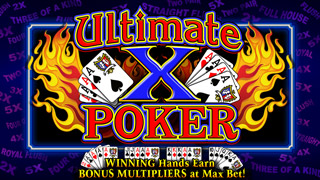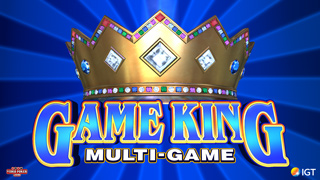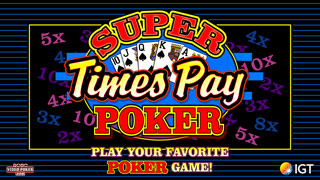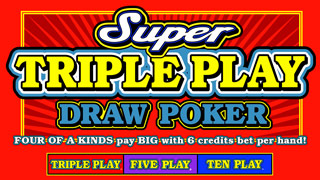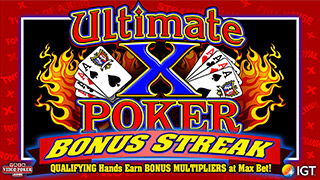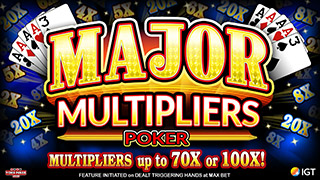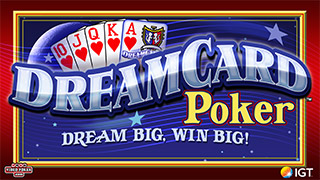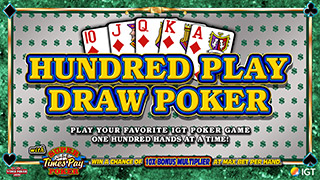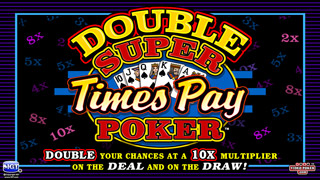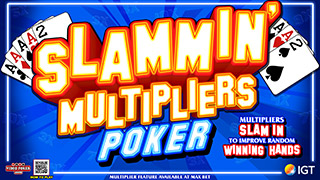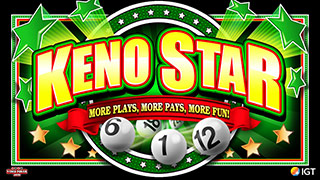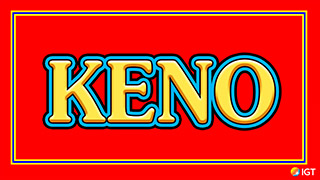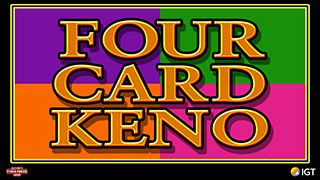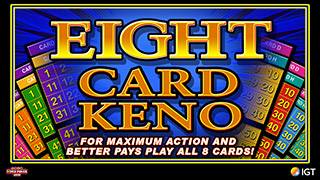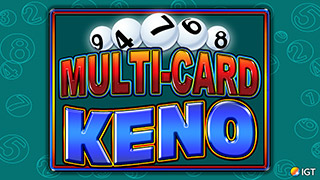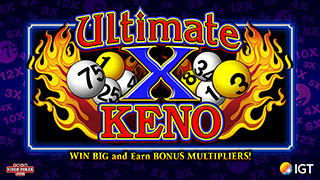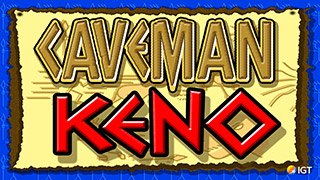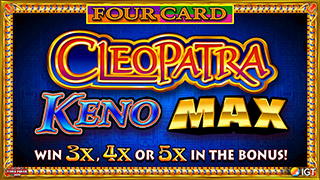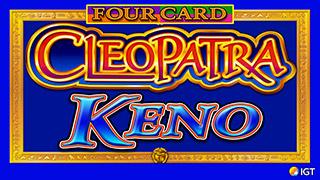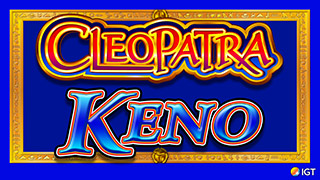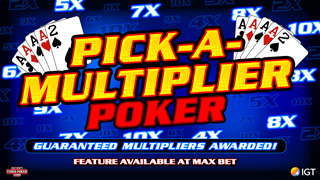How much do we still not know?
-
Vman96
- Video Poker Master
- Posts: 3298
- Joined: Tue Jul 26, 2011 12:49 am
Re: How much do we still not know?
now, back to my most recent post. a vp machine (program) does deal a random set or cards as determined by the prng. but it is my conjecture that how these cards are displayed to the player can have an impact on the final hand that a player achieves.
If it's legal in NV, MS, NJ, IL, IN, WI, IA, CO, LA, MO, AZ, MD, OH, OR, and other states I am forgetting or ignoring because they are mixed Class II/Class III jurisdictions, the order of the deal cards that are displayed to the player makes no difference as long as the player makes correct decisions. If optimal play doesn't lead to the best possible result, then the machine is illegal. Now can illegal machines exist? Hell ya. Do they in any major casino market? Unlikely.
-
shadowman
- Video Poker Master
- Posts: 3587
- Joined: Mon Oct 23, 2006 5:42 pm
In most states it is the machines that are certified after passing various test. Casinos may then install the machines. Casinos cannot buy machines that are not certified.
The idea that machines that are illegal can just be sent to casinos and installed is, as far as I know, against the regulations in all states that support class III machines.
There really is a reason the states took time to develop regulations. If someone knows of a state where this is not done, I suggest contacting a representative and making them aware.
The idea that machines that are illegal can just be sent to casinos and installed is, as far as I know, against the regulations in all states that support class III machines.
There really is a reason the states took time to develop regulations. If someone knows of a state where this is not done, I suggest contacting a representative and making them aware.
-
shadowman
- Video Poker Master
- Posts: 3587
- Joined: Mon Oct 23, 2006 5:42 pm
well, i think we have fairly well exausted what we can say concerning how a random deal of the cards in a game of vp can and/or could work. unless someone recently and directly involved in programming these machines at igt comes forward with details ( can't be a currently employed by igt ) ----there will be an onging debate.
IGT has publicly stated their machines are random and meet all local regulations. The also have stated the RNG is designed to meet the local regulations.
so i won't bother going further in the various methodologies of reseeding the games and/or switching prng algorithms. i'll be the first to admit that while i suspect some "tilting" to be afoot----i really don't know. and it could be that the games in vegas and biloxi are really "fair and random".
Not only "could be", but the probability is extremely high. Lots of APers keep track of their results and I haven't heard any indication that the games aren't random.
my next supposition involves how the vp machine ( program ) chooses to display the randomly dealt cards. after many years of playing vp and playing probably hundreds of thousands of hands----i do suspect that "how the randomly selected ten cards are displayed" is "managed" in such a way as to tilt the game in the casino's favor-----but still be deemed a random deal and within all the regulations.
Only 5 cards are selected in machines built over the last 15 years.
If they meet all regulations that require fair and random games, then they cannot be "managed". That is, by definition, not random.
while the newer machines supposedly continously shuffle the cards between draws----we rally don't know this for a fact that this happens all the time-----and if in fact the machine chose to periodicly stop doing this---it would'nt violate any regs.
Unless the local regulations require continuous shuffle which is the case in many jurisdictions.
if a machine selects more than cards on its initial hand and then displays five-----how the program chooses to display these first five cards can make a big difference in what cards you hold and therefore the outcome of the hand.
Nope. It matters not how the 5 cards are displayed, you can still choose to hold any of them you like.
how many times have you been dealt four to a flush on the first five cards----and not get the fith matching suit in the next five cards. there have been many times over the years that this pattern has presisted for so long that i began to hold a low pair vs going for the fith card to make the flush ( playing TDB and DDB ). i do realize this could all be part of the hot and cold segments of the random number stream-----but sometimes i wonder.
Or, it could be you looking for something. Unless you actually track your results it's hard to tell. For example, you can sometimes hit flushes in back-back tries. Since hitting flushes is less that 1 out of 6 you might go 12 hands without hitting it and still be right on the statistical average. If you weren't keeping track you might think 12 misses in a row was non-random.
IGT has publicly stated their machines are random and meet all local regulations. The also have stated the RNG is designed to meet the local regulations.
so i won't bother going further in the various methodologies of reseeding the games and/or switching prng algorithms. i'll be the first to admit that while i suspect some "tilting" to be afoot----i really don't know. and it could be that the games in vegas and biloxi are really "fair and random".
Not only "could be", but the probability is extremely high. Lots of APers keep track of their results and I haven't heard any indication that the games aren't random.
my next supposition involves how the vp machine ( program ) chooses to display the randomly dealt cards. after many years of playing vp and playing probably hundreds of thousands of hands----i do suspect that "how the randomly selected ten cards are displayed" is "managed" in such a way as to tilt the game in the casino's favor-----but still be deemed a random deal and within all the regulations.
Only 5 cards are selected in machines built over the last 15 years.
If they meet all regulations that require fair and random games, then they cannot be "managed". That is, by definition, not random.
while the newer machines supposedly continously shuffle the cards between draws----we rally don't know this for a fact that this happens all the time-----and if in fact the machine chose to periodicly stop doing this---it would'nt violate any regs.
Unless the local regulations require continuous shuffle which is the case in many jurisdictions.
if a machine selects more than cards on its initial hand and then displays five-----how the program chooses to display these first five cards can make a big difference in what cards you hold and therefore the outcome of the hand.
Nope. It matters not how the 5 cards are displayed, you can still choose to hold any of them you like.
how many times have you been dealt four to a flush on the first five cards----and not get the fith matching suit in the next five cards. there have been many times over the years that this pattern has presisted for so long that i began to hold a low pair vs going for the fith card to make the flush ( playing TDB and DDB ). i do realize this could all be part of the hot and cold segments of the random number stream-----but sometimes i wonder.
Or, it could be you looking for something. Unless you actually track your results it's hard to tell. For example, you can sometimes hit flushes in back-back tries. Since hitting flushes is less that 1 out of 6 you might go 12 hands without hitting it and still be right on the statistical average. If you weren't keeping track you might think 12 misses in a row was non-random.
-
williejoe
- Forum Rookie
- Posts: 31
- Joined: Sat Jul 28, 2012 10:29 am
shadowman, if one is fully convicted that regulated class III vp machinces in states like nevada and mississippi basically play the same as a random deal from a standard 52 card deck without any variation to the standard game of vp-----then i really can't disagree with your comments. but if some vp players like myself who are not quite so sure and are little reluctant to accept the prevaling part-line as an article of faith----then it's not supprising that we speculate as to what might be going on in addition to the randomness of the shuffle and deal. and shadowman----i sure hope you are correct ( and you very well could be ) and that one day i become as convinced as you as to the total randomnes of the game.
i will say this regarding one aspect of the "display" issue we both mentioned above. whether or not any such display management is actually occuring certainly can be debated---- but if it does, then how the cards are displayed can definitely impact the end result of ones final hand. a simple example would be an older vp program that deals all ten cards---then displays five to the player ( holding the others hidden ). if in the initial ten card deal, four of the ten were of the same suit----and the "display program" preferentially chose to display all of four cards of the same suit in the intial five cards-----then the player would be induced to hold the four cards to the same suit---with no chance of getting a flush. such a "display program" could explaine going fifteen to thirty times drawing to four to a flush and not getting it-----and have this go on for several days or longer on numerous machines. yes, i know this all could be attributed to the vagaries of randomess----but sometimes it makes some of us scratch our heads and wonder.
i will say this regarding one aspect of the "display" issue we both mentioned above. whether or not any such display management is actually occuring certainly can be debated---- but if it does, then how the cards are displayed can definitely impact the end result of ones final hand. a simple example would be an older vp program that deals all ten cards---then displays five to the player ( holding the others hidden ). if in the initial ten card deal, four of the ten were of the same suit----and the "display program" preferentially chose to display all of four cards of the same suit in the intial five cards-----then the player would be induced to hold the four cards to the same suit---with no chance of getting a flush. such a "display program" could explaine going fifteen to thirty times drawing to four to a flush and not getting it-----and have this go on for several days or longer on numerous machines. yes, i know this all could be attributed to the vagaries of randomess----but sometimes it makes some of us scratch our heads and wonder.
-
Vman96
- Video Poker Master
- Posts: 3298
- Joined: Tue Jul 26, 2011 12:49 am
a simple example would be an older vp program that deals all ten cards---then displays five to the player ( holding the others hidden ). if in the initial ten card deal, four of the ten were of the same suit----and the "display program" preferentially chose to display all of four cards of the same suit in the intial five cards-----then the player would be induced to hold the four cards to the same suit---with no chance of getting a flush. such a "display program" could explaine going fifteen to thirty times drawing to four to a flush and not getting it-----and have this go on for several days or longer on numerous machines. yes, i know this all could be attributed to the vagaries of randomess----but sometimes it makes some of us scratch our heads and wonder.
1) Old VP machines that prechoose the draw cards don't work that way. They randomly choose 5 deal cards, then randomly choose 5 draw cards for possible use. They aren't programmed to mix and match between the two piles.
2) If they did mix and match they would be illegal in NV, MS, NJ, IL, IN, WI, IA, CO, LA, MO, AZ, MD, OH, OR, and other states I am forgetting or ignoring because they are mixed Class II/Class III jurisdictions.
I understand your concern. Machines could be programmed to do whatever. However, I have faith in multiple state laws and that the #1 video poker manufacturer, IGT, serves all of them for their video poker needs.
Randomness in video poker is hard for us to comprehend. Humans by nature are always looking for patterns. I personally feel the cold streaks more than the hot streaks, so when I run bad, I have briefly questioned things too.
-
shadowman
- Video Poker Master
- Posts: 3587
- Joined: Mon Oct 23, 2006 5:42 pm
shadowman, if one is fully convicted that regulated class III vp machinces in states like nevada and mississippi basically play the same as a random deal from a standard 52 card deck without any variation to the standard game of vp-----then i really can't disagree with your comments. but if some vp players like myself who are not quite so sure and are little reluctant to accept the prevaling part-line as an article of faith----then it's not supprising that we speculate as to what might be going on in addition to the randomness of the shuffle and deal. and shadowman----i sure hope you are correct ( and you very well could be ) and that one day i become as convinced as you as to the total randomnes of the game.
People should always pay attention. That's why I keep records. That way I'm not prone to "feelings" and, if something does seem out of joint, I can play elsewhere.
i will say this regarding one aspect of the "display" issue we both mentioned above. whether or not any such display management is actually occuring certainly can be debated---- but if it does, then how the cards are displayed can definitely impact the end result of ones final hand. a simple example would be an older vp program that deals all ten cards---then displays five to the player ( holding the others hidden ). if in the initial ten card deal, four of the ten were of the same suit----and the "display program" preferentially chose to display all of four cards of the same suit in the intial five cards-----then the player would be induced to hold the four cards to the same suit---with no chance of getting a flush. such a "display program" could explaine going fifteen to thirty times drawing to four to a flush and not getting it-----and have this go on for several days or longer on numerous machines. yes, i know this all could be attributed to the vagaries of randomess----but sometimes it makes some of us scratch our heads and wonder.
There's one part of the regulations you might not know about. "Secondary decisions" are expressly forbidden. The example you gave above would be a type of secondary decision. In fact, anything other than displaying the cards exactly as they are dealt would constitute a secondary decision. Check out Nevada regs 14.040.
http://gaming.nv.gov/modules/showdocume ... entid=2921
People should always pay attention. That's why I keep records. That way I'm not prone to "feelings" and, if something does seem out of joint, I can play elsewhere.
i will say this regarding one aspect of the "display" issue we both mentioned above. whether or not any such display management is actually occuring certainly can be debated---- but if it does, then how the cards are displayed can definitely impact the end result of ones final hand. a simple example would be an older vp program that deals all ten cards---then displays five to the player ( holding the others hidden ). if in the initial ten card deal, four of the ten were of the same suit----and the "display program" preferentially chose to display all of four cards of the same suit in the intial five cards-----then the player would be induced to hold the four cards to the same suit---with no chance of getting a flush. such a "display program" could explaine going fifteen to thirty times drawing to four to a flush and not getting it-----and have this go on for several days or longer on numerous machines. yes, i know this all could be attributed to the vagaries of randomess----but sometimes it makes some of us scratch our heads and wonder.
There's one part of the regulations you might not know about. "Secondary decisions" are expressly forbidden. The example you gave above would be a type of secondary decision. In fact, anything other than displaying the cards exactly as they are dealt would constitute a secondary decision. Check out Nevada regs 14.040.
http://gaming.nv.gov/modules/showdocume ... entid=2921
-
faygo
- Video Poker Master
- Posts: 2925
- Joined: Tue Jan 09, 2007 6:55 am
-
williejoe
- Forum Rookie
- Posts: 31
- Joined: Sat Jul 28, 2012 10:29 am
if "secondary decisions" are indeed defined in such a clear way that they not only include how the cards are dealt---but also how the cards are displayed----then i certainly would feel better about this particular aspect of the game. i'll admit that i have not carefully read the nevada regs in quite some time. i will take a look at this.
also, to everyone one on this forum----while i do have some concerns on the details of what is going on with the progamming on vp machine-----these concerns pale into insignificane when compared with my real concern with the casinos and vp------the seemingly ever ending errosion of the paytables. over the last several years i have stopped playing at a number of casions in vegas and biloxi due to their poor paytables. i mainly play TBD and DDB ( and some of its derivative games ). these games alreay have high variability----and then to face an 8/5 TDB game is more than i can take. it seems that the casinos value the vp player less and less-----sooner or later i guess they will drive some of us back to craps and blackjack-----but hopefully, never to slots.
also, to everyone one on this forum----while i do have some concerns on the details of what is going on with the progamming on vp machine-----these concerns pale into insignificane when compared with my real concern with the casinos and vp------the seemingly ever ending errosion of the paytables. over the last several years i have stopped playing at a number of casions in vegas and biloxi due to their poor paytables. i mainly play TBD and DDB ( and some of its derivative games ). these games alreay have high variability----and then to face an 8/5 TDB game is more than i can take. it seems that the casinos value the vp player less and less-----sooner or later i guess they will drive some of us back to craps and blackjack-----but hopefully, never to slots.
-
Tedlark
- Video Poker Master
- Posts: 8764
- Joined: Mon Oct 02, 2006 12:29 am
I guess this is one we WON'T be seeing run at the Belmont faygo?
-
BillyJoe
- Video Poker Master
- Posts: 3198
- Joined: Sat Aug 23, 2008 2:00 pm
Well, while in Vegas this past week, I had dinner one evening with an exec from ZEN Entertainment, who does the NLOP Texas Hold'Em site that is associated with IGT. He also was a programmer of gaming devices. I asked him specifically if, in Vegas (where he is familiar)the VP is anything but random. He said that ALL machines that come from IGT that sit in Vegas casinos use a pseudo RNG that, for all practical purposes, are random. They all do continuous shuffling. There is no option that the casino can control, once the machine has been certified to be installed, that can change that.
It was the most convincing 'evidence' that I have come across on this subject.
It was the most convincing 'evidence' that I have come across on this subject.



